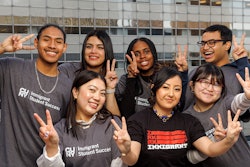At Portland Community College (PCC), administrators and faculty are looking for ways to meet the needs of some of the most vulnerable students on campus, including students who have previously been in the foster care system.
 Lisa Féinics leads Portland Community College’s program for students who have experience with the foster care system.
Lisa Féinics leads Portland Community College’s program for students who have experience with the foster care system.
College assistance programs for former foster youth, or foster alumni, vary state by state. California, for instance, offers foster alumni grants and tuition waivers to help them achieve their higher education goals. Oregon also offers a tuition waiver to foster alumni to attend public colleges and universities in the state, but educators on campus say that targeted assistance, in addition to tuition dollars, is necessary to help more students succeed.
“They are one of the most vulnerable population of students,” said Neal Naigus, assistant to PCC’s CLIMB executive director, and an administrator who has been involved in efforts to facilitate better services for PCC’s former foster youth students.
“We felt that we needed to provide a safety net and support network, so that there would be people who were around the college and in the community who would be able to assist them,” Naigus said.
Starting at age 18, foster youth age out of the system, often leaving them without the structure that guided them to that point. While it is impossible to generalize about the individual experience of foster care — some have positive home placements, others less so — statistics indicate that once they are on their own, relatively few move on to college and fewer still earn a degree or certificate. According to the Oregon Foster Youth Connection, only 25 percent of former foster youth enter college, and only 6 percent complete a 2- or 4-year degree.
Yet PCC is home to many former foster youth in Oregon. School enrollment data for fall 2016 found that 290 PCC students self-identified as having been involved with the foster care system at least once in their lives. Since the enrollment data applied only to students who are 25 years old or younger, college representatives say that there are probably older students on campus who may have been in foster care.
The college first began to consider a program for students who have experience with the foster care system after Oregon passed its tuition waiver bill in 2011. The program that resulted from these efforts is now called the Fostering Success Program. It comprises a network of faculty and staff at PCC’s four campuses who have volunteered to serve as “campus champions,” meaning that they are available to support students who have been involved with the foster care system.
Lisa Féinics, who joined PCC this summer, now heads the program and network of campus supporters. Previously, Féinics was a life skills coach with the MPowering My Success program at the University of Michigan-Flint, which has a robust programming serving foster youth.
As someone who has had experience with the foster care system herself, Féinics is in an ideal position to work with that population. Féinics was just 8 when she was first placed in foster care, and after multiple home placements, ran away at age 16. She later returned to school to complete her GED and went on to earn a Ph.D. in neurobiology and behavior from the University of Washington in Seattle.
Féinics is an advocate of helping students develop the skills to help himself or herself, primarily.
“Frequently, when individuals get involved in helping foster youth, they get very invested once they hear their stories, many of which can be quite horrendous,” she said. “They just want to rescue them, but unfortunately that doesn’t always benefit the student. You can’t rescue them because they’re adults now, and they kind of have to rescue themselves.”
While she stresses individuals have a wide spectrum of experience when it comes to foster care, often she finds that her work involves helping students develop certain life skills that they may not have had the chance to acquire growing up. They may need assistance with money management, healthy meal planning or referrals to other social services, Féinics said.
“Part of what makes this such challenging work is that you have to empathize, and you have to build trust, but you also can’t have the wool pulled over your eyes,” she said. “You have to understand that ultimately it is the students’ choice to be successful or not.”
It can take many years, if not decades, for some individuals who have gone through the foster care system to return to school, Féinics said. She noted that she recently worked with a woman in her 60s at the college who went through the foster care system and is currently working towards a GED.
“So we really see that there’s a need, no matter how long ago they were in foster care,” Féinics said. “Some people continue to struggle with having been through the system for their entire lives.”
As for the future of the program, Féinics said that would largely be dependent on how much money the college can raise for its efforts. The college is still raising the funds to make it a more viable and extensive program. Naigus said that he is “confident” in the college’s ability to raise the money.
“It’s not just younger students that we hope to help with our program, but all students,” he said.
Staff writer Catherine Morris can be reached at [email protected].









